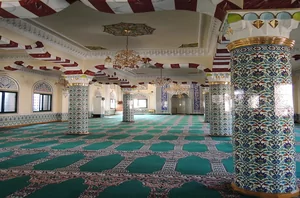Love is the greatest station the seeker on the path to Allah (subḥānahū wa taʿālā) can attain. The love of Allah is the purest and greatest of all loves. It gives life to the heart, it is sustenance for the soul, and is the roadway to eternal success.
Love is the road to Paradise. It is the main reason why we worship Allah, and it is the only way to live a true meaningful life on earth.
Without the love of Allah, life is bleak. This is because there is a void in every person’s heart which can only be filled with the love of Allah. Without love, a person’s life will be full of sadness, anxiety, pains and regrets. On the other hand, when the heart overflows with His love, a person will experience bliss and contentment.
Ibn al-Qayyim (raḥimahullāh) writes, “Undoubtedly, the greatest pleasure of this world is the pleasure of knowing and loving Allah. This is the highest level of bliss one can experience in this world. In contrast, other temporary pleasures of this life are like a drop in the ocean – for indeed, the soul, heart and body were created (to know and love Allah). The most joyous aspect of the world is to know and love Allah, and the greatest pleasure in Paradise will be to see Allah.”
Love: The Essence of La ilaha illa-Allah
Love is the essence of ʿubūdiyyah (servitude) and the secret of Lā ilāha illā-Allāh. Loving Allah is the basis of our īmān. Allah says, “Still there are some who take others as Allah’s equal—they love them as they should love Allah—but the believers love Allah even more” (2:165). When a person lacks the love of Allah, he is like a body without a soul.
Our purpose in life is to worship (ʿibādah) Allah. ʿIbādah consists of:
(1) utmost humility and
(2) utmost love.
Without love, there is no ʿibādah, as love is the ‘soul’ of worship. Without love, we cannot realise our purpose of existence. Without love, there is no Islam.
There is a vast difference between someone who obeys Allah out of love for Him, and someone who obeys Him without love. When a lover obeys his beloved, the obedience is done willingly and sincerely. Without love, however, a servant obeys out of a weary compulsion. The former experiences happiness and joy in willingly complying to the orders, whereas the latter feels burdened, and even resentful. Love, therefore, is the driving force and the impetus of ʿibādah.
“The hearts only find true delight and pleasure in loving Allah and drawing close to Him by doing what He loves – and this is only possible if the person turns away from every other object of his love. This is the reality of لَا إِلٰهَ إِلَّا الله and it is the religion of Ibrāhīm (ʿalayhis-salām), the Close Friend of Allah, and, indeed, all the Prophets & Messengers (ʿalayhimas-salām).” – Ibn Taymiyyah (raḥimahullāh)
How Can You Not Love Him?
As humans, we adore perfection, and Allah is the epitome of perfection. Similarly, we love beauty and our hearts are naturally inclined to it. Allah is al-Jamīl, The Most Beautiful. Although we cannot comprehend the beauty of Allah, it is enough to know that every beautiful thing we see on this earth is from Him.
Likewise, our hearts have been created with a natural disposition to love those who do good to us. How can we not love Allah when every single blessing and good that we have is from Him? There is no one kinder, more appreciative and more generous than Him: He is al-Waḥḥāb, The Ever-Giving.
Allah is al-Wadūd, The Most Loving. Anyone we love – from the creation – loves us for their sake. Allah, on the other hand, loves us for our own benefit. People interact with us because they hope to attain something from this relationship. Allah however calls us to love Him so that we can benefit. Not only does He benefit us, but He gives us compound benefit: the reward of a good deed is multiplied from 10-700 times, whereas a sin is recorded as one single bad deed; and even that can be swiftly erased. Allah does not need us, yet He feeds us, honours us, and guides us.
Allah is al-Ghaffār, The Most Forgiving. He loves to forgive and will forgive us even if we go to Him with mountains of sins. He is al-Sittīr, the Concealer of sins. He does not expose us, nor humiliate us. Instead, He offers us endless opportunities to repent, and delights when we turn to Him in repentance.
Allah is al-Qarīb, The Ever-Near, and al-Hayiyy, The Shy, who feels shy to reject our duʿās. Whilst our fellow humans tire of our persistent questioning and begging, Allah, our Generous Lord, does not stop giving and is angered when we don’t ask from Him! In fact, He gives us even before we ask Him.
How can we not love Him?
Love, Hope and Fear
As believers, we journey to Allah with love, fear and hope. Ibn Taymiyyah (raḥimahullāh) said, “Know that there are three things that push the hearts towards Allah: love, fear, and hope. The strongest of these three is love; and it is something that is sought-after in and of itself, since it is something that is desired both in this world and the hereafter, as opposed to fear, which will disappear in the Hereafter. Allah says, ‘For certain, the friends of Allah shall have no fear, nor shall they grieve’ (10:62).”
Similarly, hope has its limit. Too much hope leads to wishful thinking and lack of action. Fear too has a limit, as too much of it leads to despair. Love, on the other hand, has no limit. A servant can continue increasing in his love for Allah, and it will never be too much.
True Love
When the love of Allah solidifies in the heart, nothing can come between the person and his Beloved, Allah. One becomes ready to give up everything for Him.
Loving Allah (ʿazza wa jall) can only be achieved when you prefer Him over everything else. You must love Him more than you love your parents, children, spouse, friends and wealth. Allah says, “Say: If your parents, children, siblings, spouses, extended family, the wealth you have acquired, the trade you fear will decline, and the homes you cherish — (if all these) are more beloved to you than Allah and His Messenger and struggling in His cause, then wait until Allah brings about His command. Allah does not guide the defiantly disobedient people” (9:24).
The Companions (radiy Allāhu ʿanhum) lived this verse, and were thus honoured and loved by Allah. Allah says, “Allah is pleased with them, and they are pleased with Him” (58:22).
One such example is the legendary Companion, Muṣʿab b. ʿUmayr. The Prophet ﷺ once saw him approaching, wearing a sheepskin tied to his waist (in stark contrast to the expensive clothes he used to wear prior to accepting Islam). The Prophet ﷺ said, “Look at this man whose heart Allah has illuminated! I saw him when his parents used to provide him with the finest of foods and drink; but the love of Allah and His Messenger drove him to what you see.”
Similarly, Saʿd b. Abī Waqqāṣ narrates that in the Battle of Uḥud, ʿAbdullāh b. Jaḥsh said to him, “Won’t you come so we can make duʿā’ together?” They went to a corner and sat. Saʿd supplicated, “My Lord! When I meet the enemy tomorrow, let me encounter a man of enormous strength and whose enmity is severe. I shall fight him for Your sake, and he shall fight me. Then grant me victory over him until I slay him and acquire his spoils.” To this duʿā’ ʿAbdullāh said “Āmīn”, and then he himself supplicated, “O Allah, grant that I encounter a man tomorrow of enormous strength and whose enmity is severe. I shall fight him for Your sake, and he shall fight me. He shall kill me, and then cut off my nose and ears. And when I meet You, You will say, “ʿAbdullāh! Why were your nose and ears cut off?” Then I will say, “For Your sake and for the sake of Your Prophet.” And then You will say, “You have spoken the truth.”
Saʿd (raḍiy Allāhu ʿanhu) related this incident to his son and said, “The duʿā’ of ʿAbdullāh b. Jaḥsh was better than my duʿā’: I saw him at the end of the day. (He was martyred) and his nose and ears were hanging on a thread.”
Allāhu Akbar! The Companions did not just verbally affirm their love for Allah, but they proved their love with their actions.
Do We Truly Love Allah?
How do we know if we truly love Allah? Are our claims of loving him genuine? Allah says,
“Say: If you (sincerely) love Allah, then follow me; Allah will love you and forgive your sins. For Allah is All-Forgiving, Most Merciful” (3:31).
Thus, the litmus test of loving Allah is whether one follows and obeys the Messenger ﷺ. Ibn Rajab (raḥimahullāh) writes, “Whosoever loves Allah and His Messenger sincerely from his heart, it will necessitate that he loves in his heart what Allah and His Messenger love; hate what they hate; be pleased with what pleases them; and be displeased with what displeases them; and his limbs and body will then conform to whatever this loving and hating necessitate.”
Abū Yaʿqūb al-Nahrujūrī said, “Whosoever claims to love Allah, – Mighty and Majestic is He – but doesn’t comply with Allah in His commands, his claim is false. For every lover that does not fear Allah, is deluded.”
Attaining the love of Allah is a journey. It may be that at the beginning, one is unable to fully love what Allah loves as his heart is imprisoned by his desires. However, as one’s love for Allah increases through worship, one liberates himself from his own desires. The love of anyone other than Allah slowly fizzles away, and Allah’s preferences become his own preferences.
“Whoever would love to know whether Allah loves him, he should examine his relationship with the Qur’ān: If he loves the Qur’ān, then he loves Allah, as the Qur’ān is the Word of Allah.” – ʿAbdullāh b. Masʿūd (raḍiy Allāhu ʿanhu)
Part 2 explores how we can attain the love of Allah and the positive outcomes of loving Allah.
May Allah al-Wadūd (The Most Loving) make His love more beloved to us than a cool quenching drink on a scorching hot day.





